Gangster films, a captivating subgenre of crime cinema, primarily revolve around the intricate world of organized crime. Their roots trace back to the 19th century, a period marked by the rise of post-capitalism, which widened the gap between the rich and poor, inadvertently fostering a culture ripe for organized crime. Among these, Mafia films stand out as particularly popular, though the realm of exceptional gangster films extends far beyond just the Mafia. As a devoted enthusiast of this genre, I find myself drawn to the unique cultures and the exploration of society’s darker facets that these films offer. The dramatic rise and fall narratives provide viewers with a profound sense of life’s multifaceted nature. In this article, I present my curated list of the 15 most remarkable gangster films, each distinguished by its distinct style, portrayal of diverse characters, and rich cultural backdrop.
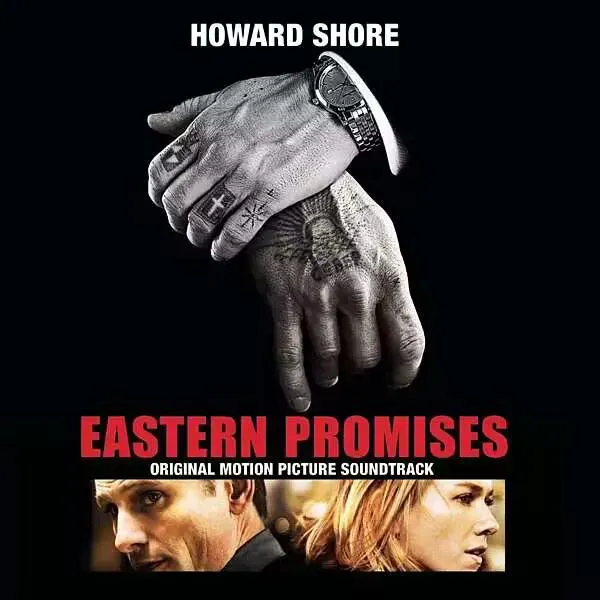
Top 15 Gangster Films
15. Eastern Promises
Directed by David Cronenberg, known for his body horror films, and starring Viggo Mortensen, Eastern Promises is a gripping Russian Mafia film. The story centers on Anna, a midwife who delivers the baby of a 14-year-old Russian drug-addicted prostitute and uncovers a connection between the Russian Mafia and the girl through her diary. The film is renowned for its realistic depiction of violence and gore, while also exploring the internal conflict between good and evil, right and wrong, and the fine line between justice and wickedness. Viggo Mortensen’s performance is particularly noteworthy, earning him an Oscar nomination for Best Actor. The intense, nude fight scene in the bathroom is a standout, delivering a visceral and auditory experience that rivals real MMA matches, immersing the audience in the brutal reality of street violence. Overall, Eastern Promises excels in both plot and performance, introducing innovative elements to the gangster film genre. Notably, the absence of guns paradoxically enhances the film’s raw portrayal of violence, subverting the desensitization often associated with gun-centric movies, making it a superior work in the genre.
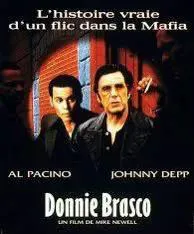
14. Donnie Brasco
Donnie Brasco, directed by Mike Newell and starring Johnny Depp and Al Pacino, is based on a true story. The film recounts the experiences of Joseph Pistone, an FBI undercover agent in the 1970s, who infiltrated the Bonanno crime family in New York under the alias Donnie Brasco, thanks to his association with Lefty Ruggerio. Donnie Brasco places a strong emphasis on character development. Brasco must navigate the pressures of maintaining his cover, especially while carrying recording equipment, and balancing relationships on both sides of the law while striving to climb the ranks. Despite his professional success, his family life suffers. Lefty, an aging and disillusioned mobster, finds himself increasingly reliant on Brasco due to his inability to advance in the organization. The film uniquely portrays the dark sides of both the gangster and undercover agent professions, highlighting their psychological conflicts and struggles.
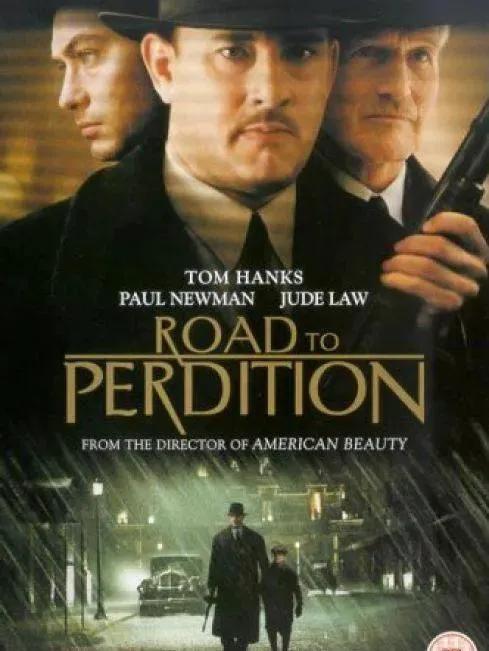
13. Road to Perdition
Directed by Sam Mendes, following American Beauty, Road to Perdition boasts a stellar cast including Tom Hanks, Paul Newman, Daniel Craig, and Jude Law. Set during the Great Depression in 1931, the film follows an Irish mob enforcer who embarks on a path of revenge with his son after his family is murdered by the gang. This film stands out in the gangster genre by focusing on the father-son relationship rather than the typical emphasis on a single character or the entire organization. Like Mendes’ other works, the film prioritizes cinematography and its psychological impact over plot structure. While characters outside the father-son dynamic are not fully developed, the film’s visuals are captivating, leaving a lasting impression on the audience. Combined with a compelling soundtrack, the film effectively conveys symbolic imagery. Road to Perdition received six Academy Award nominations, ultimately winning Best Cinematography, making it a worthwhile watch.
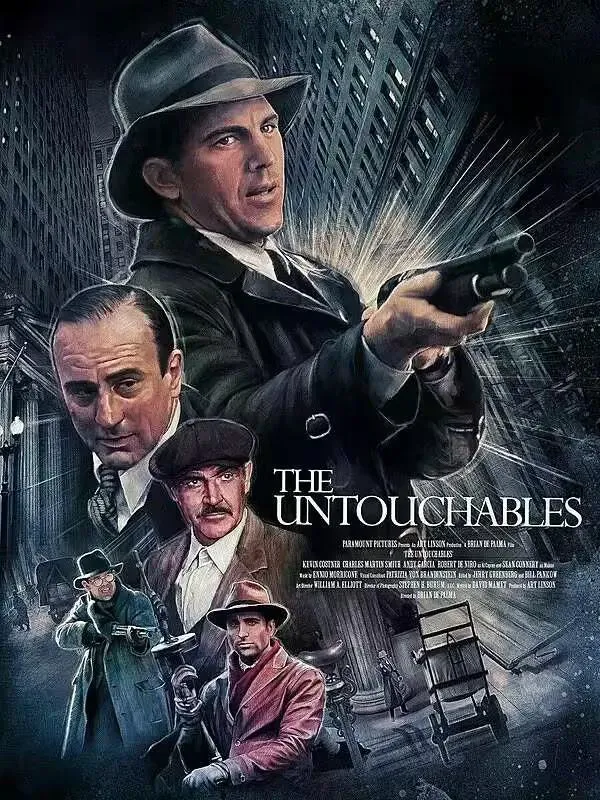
12. The Untouchables
The Untouchables, directed by Brian De Palma, is based on the novel of the same name, which is inspired by true events. Starring Kevin Costner, Sean Connery, and Robert De Niro, the film is set in 1930s Chicago during Al Capone’s reign, where he controlled the bootlegging market through violence. Treasury agent Eliot Ness teams up with veteran cop Jim Malone to form a special task force, including a sharpshooter and an accountant, to dismantle Capone’s Chicago Outfit. The film focuses on the side of justice, with De Niro’s portrayal of Capone being particularly vivid. The film’s elements are diverse, blending violence with dark humor, and balancing lighthearted moments among the task force members with their deep camaraderie. Sean Connery, after his legendary run as 007, delivers a memorable performance as the tough-but-fair cop Jim Malone, earning him an Oscar for Best Supporting Actor and revitalizing his career.
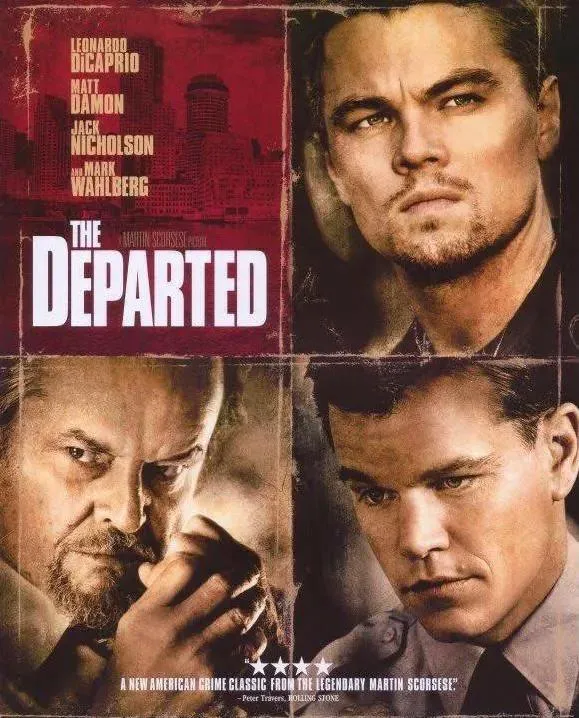
11. The Departed
The Departed, directed by Martin Scorsese, is an adaptation of the Hong Kong film Infernal Affairs, directed by Andrew Lau and Alan Mak. Starring Leonardo DiCaprio, Matt Damon, Jack Nicholson, and Mark Wahlberg, the story takes place in Boston, where the Irish mob plants a mole in the Massachusetts State Police, while the police send an undercover agent into the Irish mob. The debate over which version is superior continues. Many consider this one of Scorsese’s best works, alongside Taxi Driver in the 70s, Raging Bull in the 80s, and Goodfellas in the 90s. The film’s structure is impeccable, with excellent editing and music. The performances are highly praised, especially Nicholson’s, which many consider one of his best. It won six Academy Awards, including Best Picture and Best Director. However, in my opinion, while nearly perfect, it leans more towards a crime thriller than a pure gangster film, preventing it from reaching my top 10.
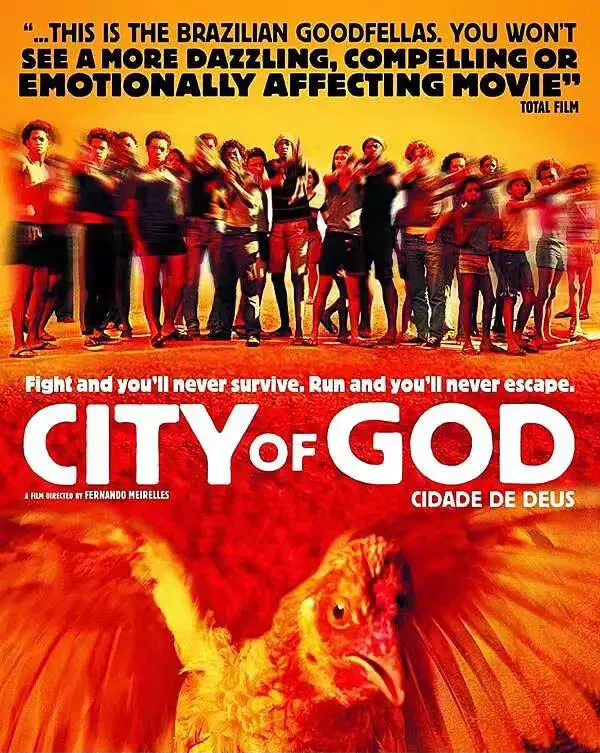
10. City of God
City of God, directed by Fernando Meirelles and Kátia Lund, is a Brazilian crime film based on the novel of the same name, which is partially based on real events. The film depicts the rampant organized crime in the favelas of Rio de Janeiro in the 1960s, including robbery, murder, arson, rape, and extortion. The story is told through the eyes of a photographer who documents his experiences from childhood. City of God is highly acclaimed, receiving four Oscar nominations and being ranked among the greatest films of all time by Time and Empire. The film realistically portrays the chaos of the favelas, emphasizing the vicious cycle of a corrupt society from the perspective of the protagonist’s childhood. Many scenes and stories are both appalling and pitiable. Among gangster films, City of God delivers perhaps the deepest emotional impact, removing commercial filters and forcing viewers to confront the ugliest aspects of society, experiencing the dark world farthest from the reach of law.
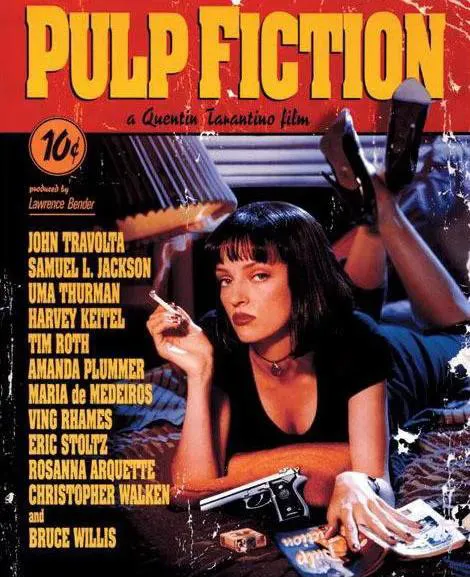
9. Pulp Fiction
Pulp Fiction, directed by Quentin Tarantino and starring John Travolta, Samuel L. Jackson, Bruce Willis, Uma Thurman, Harvey Keitel, and Tim Roth, consists of three interconnected stories. This film is one of the most famous and influential in popular culture. With its innovative script structure, diverse characters, humorous plot, and violent aesthetics, it is a standout neo-noir film. Initially, I hesitated to include it in this list, as it is often categorized as a black comedy. However, due to its alignment with the definition of a gangster film and its overall greatness, I placed it at number 9. In terms of pure cinematic importance, Pulp Fiction deserves a higher ranking, but as a gangster film, it lacks the purity I seek.
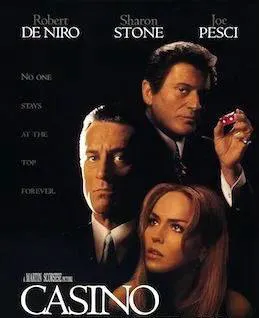
8. Casino
Casino, directed by Martin Scorsese, is based on the non-fiction book Casino: Love and Honor in Las Vegas and stars Robert De Niro, Joe Pesci, and Sharon Stone. The plot revolves around a top Jewish gambling expert who is hired by the Italian Mafia to oversee a casino in Las Vegas. While similar to Scorsese’s Goodfellas from five years prior, it did not receive the same level of acclaim. The plot is engaging, with Pesci delivering a performance on par with his role in Goodfellas. Stone’s portrayal of the cunning and selfish wife is particularly memorable, showcasing both her cold charm and greedy nature. The film is a pleasure to watch, with its thrilling plot, distinct characters, immersive soundtrack, and surprising details, making it a superior gangster film.
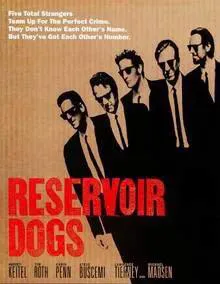
7. Reservoir Dogs
Reservoir Dogs is Quentin Tarantino’s debut film, starring Harvey Keitel, Steve Buscemi, Michael Madsen, and Tim Roth. The story revolves around a group of criminals who suspect a rat after a jewelry heist goes wrong. This film is one of the most successful independent films in history, praised by critics for its classic cinematic elements. The severed ear is a nod to David Lynch, the bathroom murder evokes Psycho, and the non-linear plot resembles Rashomon. The film uses extreme violence to showcase dark humor, and Tarantino’s script is exceptional, particularly the non-linear structure that keeps viewers engaged. This film showcases Tarantino’s purest style.
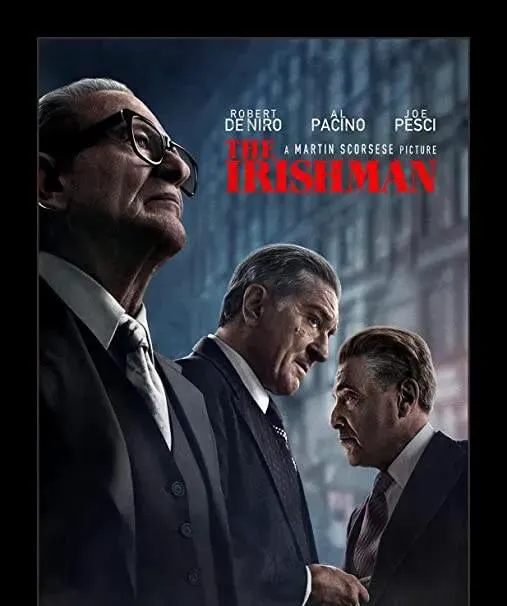
6. The Irishman
The Irishman, directed by Martin Scorsese, is based on Charles Brandt’s memoir I Heard You Paint Houses and stars Robert De Niro, Al Pacino, and Joe Pesci. The story follows truck driver Frank Sheeran’s experiences working for the Bufalino crime family and Jimmy Hoffa, and his complex relationships with them. This is Scorsese’s longest and most expensive film, and the audience feels like they are listening to an old man tell a story, seemingly mundane but with occasional sparks. Unlike other gangster films, The Irishman lacks dramatic plots or memorable violent scenes, but it excels in character development. Viewers should try to understand the story from Sheeran’s perspective, feeling his loneliness and struggles amid conflicting interests. The film is like fine whiskey, not needing strong flavors to dominate the palate, but slowly permeating and lingering with its fragrant aroma. The flawless execution of all other elements compensates for the subdued plot, immersing viewers in Sheeran’s profound solitude.
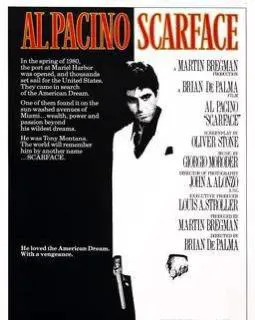
5. Scarface
Scarface, directed by Brian De Palma and starring Al Pacino and Michelle Pfeiffer, is a remake of the 1932 film of the same name. The story follows Tony Montana, a Cuban refugee who arrives in the United States after Castro’s rise to power and builds a drug empire through ambition and ferocity. Initially, the film was poorly received due to its portrayal of Cuban immigrants and excessive violence, but it has since been re-evaluated and is now considered a classic gangster film. Scarface expanded the boundaries of commercial cinema, showcasing violence with striking aesthetics and hinting at incest. Pacino’s performance is outstanding, perfectly embodying the volatile Montana. The final scene, “Say hello to my little friend!” is iconic. We see how Montana’s courage and selfishness lead him to the top and then to his downfall, illustrating the rise and fall of life and the consequences of one’s actions.
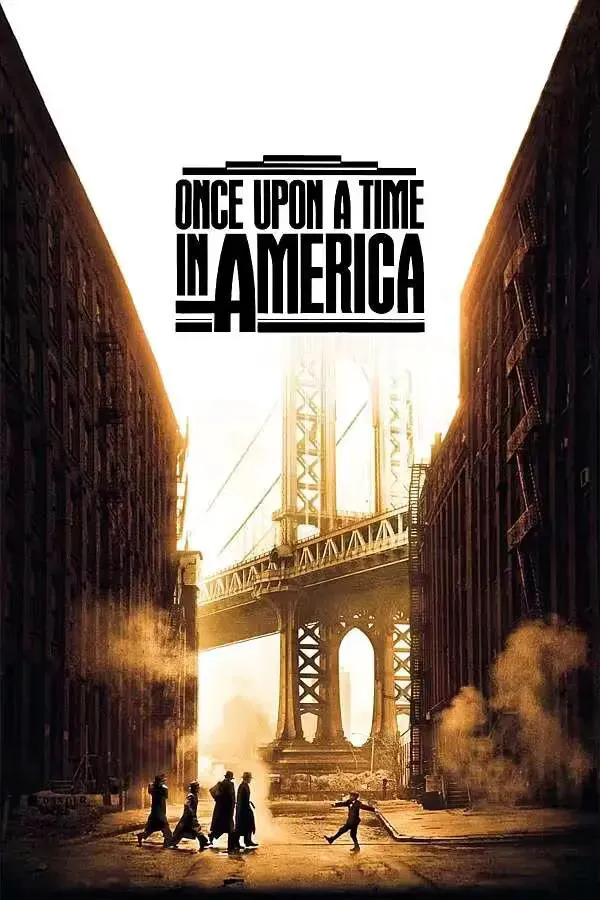
4. Once Upon a Time in America
Once Upon a Time in America, directed by Sergio Leone and starring Robert De Niro, Joe Pesci, and James Woods, is an epic crime film about Italian-American gangsters and the final installment in Leone’s America Trilogy. Set in New York’s Jewish community, the story follows a group of boys who grow up to become mob bosses. The film’s non-linear narrative, divided into old, middle, and young timelines, is its defining feature. The film revolves around the protagonist, Noodle, and New York City, showcasing his growth and the city’s evolution. Once Upon a Time in America is the most comprehensive gangster film, covering friendship, love, lust, greed, betrayal, loss, and regret, fully portraying life’s strongest emotions. The costume design and soundtrack are also noteworthy, making it a classic with high completion in all aspects.
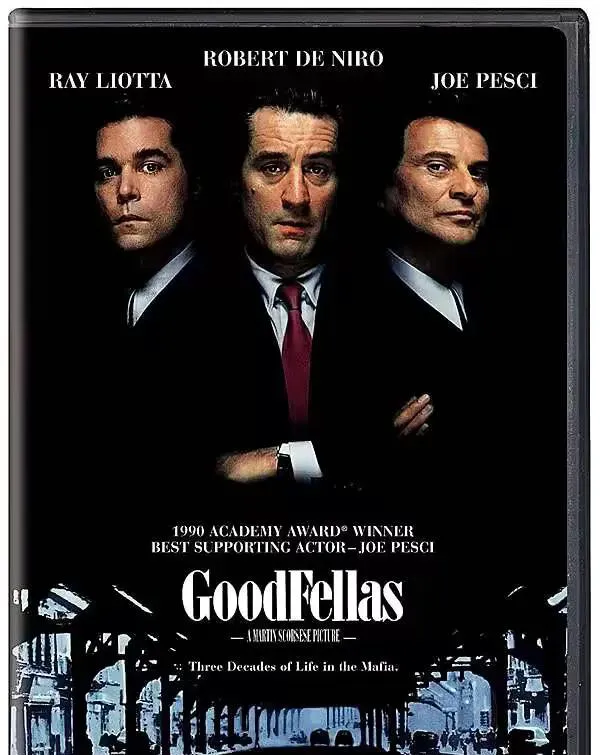
3. Goodfellas
Goodfellas, directed by Martin Scorsese and starring Ray Liotta, Robert De Niro, and Joe Pesci, is based on a true story. The film chronicles the rise and fall of mobster Henry Hill and his friends from 1955 to 1980. The film excels in all aspects, with a realistic plot, unique cinematography, perfect acting, skillful use of light and shadow, a perfect soundtrack, striking costume design, and impeccable editing. Goodfellas is undeniably one of the most classic gangster films and Scorsese’s finest work. Its realism is enhanced by the fact that it is based on a true story. The first-person narration provides insight into the unique values and lifestyles of mob members. Scorsese does not romanticize or downplay the facts to create heroism, but focuses on the greed, ruthlessness, arrogance, and pride of the members, as well as the corrupt social atmosphere and the influence of the underworld. Goodfellas contrasts with the heroic Godfather series; while The Godfather inspires fascination with the mafia, Goodfellas evokes fear and distance.
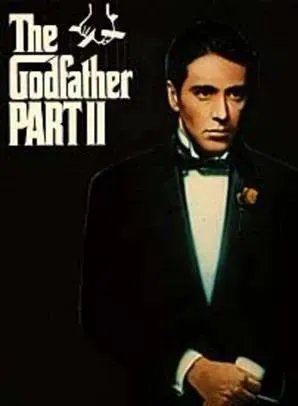
2. The Godfather Part II
The Godfather Part II, directed by Francis Coppola and starring Al Pacino, Robert De Niro, Robert Duvall, and Diane Keaton, is the sequel to The Godfather, based on Mario Puzo’s novel. The film follows Michael Corleone as he expands the family’s business after his father’s death, interweaving the backstory of Vito Corleone’s rise. The film continues the high quality of the first, with stunning cinematography and outstanding performances. Some fans consider it superior to the first, with the dual narrative structure of Vito Corleone’s story being more compelling than the first film’s linear plot. The plot arrangements of both films are equally brilliant, with the first film having slightly more tension, while the second focuses on the contrast between Michael and Vito Corleone. Both are among the greatest films in history, and I plan to write a separate review of The Godfather Part II in the future.
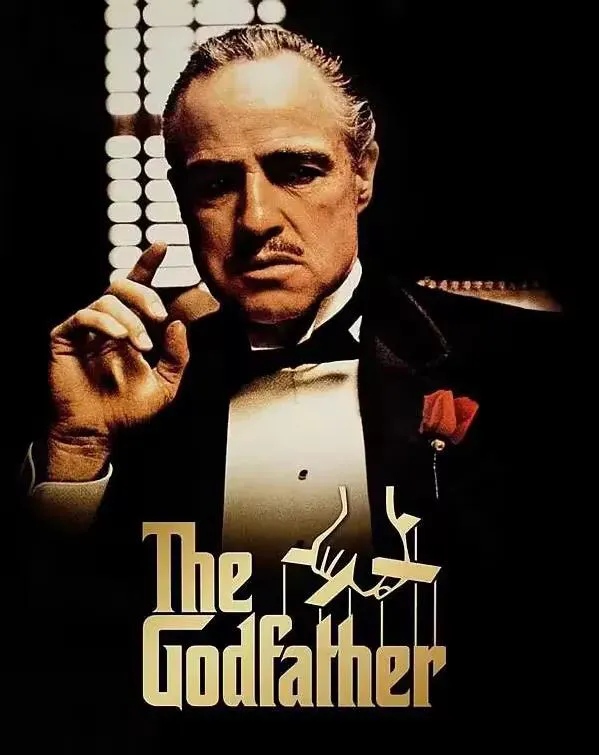
1. The Godfather
If you haven’t read my review of The Godfather, I recommend doing so, as its greatness cannot be fully expressed in a single paragraph. I chose to place The Godfather ahead of The Godfather Part II due to its irreplaceable sacredness in my mind. Without the first, there would be no second, and their relationship is like the contrast between Vito and Michael Corleone, each with its own supporters and unique advantages. However, I believe everyone agrees that the success of both films, like Vito and Michael, is a perfect intergenerational transition.